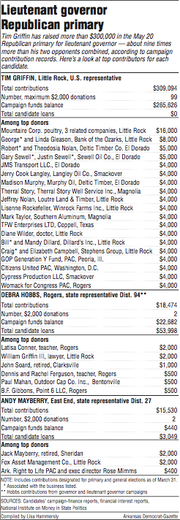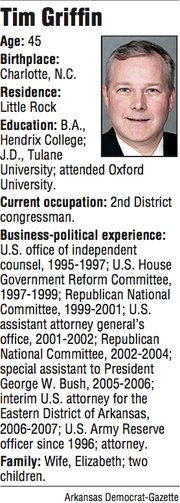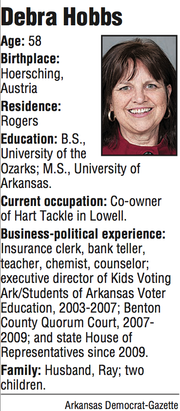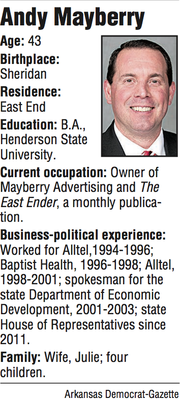No. 2 spot’s GOP battle a three-way
Sunday, May 4, 2014
State Reps. Andy Mayberry of East End and Debra Hobbs of Rogers are gently poking at U.S. Rep. Tim Griffin of Little Rock as the three seek the Republican nomination for lieutenant governor in the May 20 primary - a position that will remain vacant for the rest of the year.
RELATED ARTICLES
http://www.arkansas…">Contested races for state and federal officeshttp://www.arkansas…">Contested races for local officeshttp://www.arkansas…">Early voting in party primaries starts Mondayhttp://www.arkansas…">Two in auditor race spar over credentialshttp://www.arkansas…">GOP field sees 3 seek state’s top legal posthttp://www.arkansas…">Clinton: Mike Ross has ‘better record’ for governor
While Mayberry and Hobbs have struggled to raise tens of thousands of dollars, Griffin has collected hundreds of thousands.
The lieutenant governor’s post has been empty since Feb. 1, after Mark Darr resigned
The Springdale Republican quit more than a month after the Arkansas Ethics Commission fined him $11,000 for misspending campaign funds and taxpayer dollars. The entire state congressional delegation and Democratic Gov. Mike Beebe urged Darr to step down after he received the largest penalty in Ethics Commission history. The resignation followed threats of impeachment from some state lawmakers.
Under a law passed this year, Beebe can leave the job unfilled for the rest of Darr’s term.
If one among Mayberry, Hobbs and Griffin fails to win a majority of the votes in the May 20 primary, the two top vote-getters will advance to the June 10 runoff. The Republican nominee will take on Democrat John Burkhalter of Little Rock, a former state highway commissioner, and Libertarian candidate Christopher Olson of Leslie in the Nov. 4 general election. The winner takes office in January.
The lieutenant governor is paid nearly $42,000 a year, and the job’s primary responsibilities are to preside over the state Senate when it’s in session and to serve as acting governor when the governor is outside the state.
Mayberry, who has served in the state House of Representatives since 2011, said voters should cast their ballots for him because he’ll push to permanently eliminate the post.
No matter whether he’s elected, he said, he’ll ask the Legislature to refer to voters a proposed constitutional amendment eliminating the lieutenant governor’s office and putting the secretary of state next in line to serve as governor. If voters approve it in 2016, it would take effect in 2019.
Mayberry said his proposed amendment would save taxpayers about $400,000 a year and make state government smaller.
“I think it is the right thing to do,” he said. “I intend to pursue it whether I am lieutenant governor or not, [but] a lieutenant governor can make the public case for it with the bully pulpit.”
The call by Mayberry, who lost a challenge to Democratic U.S. Rep. Vic Snyder of Little Rock in 2006, to abolish the office came Feb. 24 - nearly two weeks after Griffin announced his intention to run for the office and six months after Mayberry announced his own campaign.
Mayberry said the timing is a coincidence and he started working on the proposed amendment in January after people started asking, “Do we really need the office?”
In response, Griffin said, “I take him at his word, but his votes in 2013 to increase funding for the lieutenant governor’s office and two months ago in March 2014 to fully fund the office at the same time he was campaigning to eliminate it are puzzling.”
Mayberry said no lawmakers voted against the appropriations bills granting spending authority for the lieutenant governor’s office. The office’s four employees have agreed to resign, that step effective June 30.
Griffin and Mayberry said they would cut the lieutenant governor’s four-employee staff in half; Hobbs also said the lieutenant governor could function with just two staff members.
Griffin, who has served in the U.S. House of Representatives since 2011, called Mayberry’s proposed amendment “a bad idea.”
The lieutenant governor’s office plays an important role, he said. The lieutenant governor became the governor twice in the past 22 years, he noted. Jim Guy Tucker, a Democrat, was promoted after Bill Clinton won the presidency in 1992. Mike Huckabee, a Republican, became governor in 1996 after Tucker was convicted of fraud and conspiracy and resigned.
The secretary of state has a role different from the lieutenant governor’s, and “I think the way it is currently constructed is the best way to do it,” Griffin said.
The secretary of state’s duties include helping counties with elections, maintaining a statewide voter-registration system, caring for and providing security at the state Capitol and its grounds, and maintaining a number of business and state records.
Hobbs said she won’t take a stand on eliminating the office until she’s received and studied the precise language of the proposal.
Hobbs said it will take a citizens-led campaign to gather signatures of registered voters to qualify such an amendment for the ballot because the Legislature is going to be reluctant to refer the proposal to voters if the next lieutenant governor belongs to the same party that controls the Legislature.
Mayberry didn’t say whether he’d lead a citizens campaign for his amendment if lawmakers balk, saying he’ll “cross that bridge if it comes to that.”
Griffin said voters should cast their ballots for him in the primary because he’s uniquely qualified to be lieutenant governor, citing his time in Congress and almost 18 years in the Army Reserve, plus his experience as federal prosecutor and owner of a law firm and public-affairs business.
He said he’ll advocate for conservative policies as lieutenant governor to create jobs in Arkansas and to enable the state to better compete for jobs with other states.
Griffin also said he wants to push for tax overhaul as lieutenant governor and he’ll unveil his own proposal later in the campaign.
Griffin, who endorsed Republican gubernatorial candidate Asa Hutchinson of Rogers in November, said he supports Hutchinson’s proposal to cut state individual income taxes by about $100 million during Hutchinson’s first year in office.
Griffin said his own tax-revamp proposal will be broader in scope and take longer to accomplish.
“The key will be to work together with the folks who have the power to enact changes and convince them bold change is what we need if we are going to compete with other states and grow jobs,” he said.
He said he also wants to work on reviewing each state agency to make them “more respectful of taxpayer dollars,” and to create “a parallel track of excellence” beyond college for high-skills training.
Hobbs and Mayberry said Griffin would be in a better position to push for changes in the state’s tax code if he ran for governor or for the Legislature, to serve on its revenue and tax committees, rather than for lieutenant governor.
In response, Griffin said, “I appreciate their career advice. But I am excited about this position. We will have a great governor,” referring to Hutchinson.
If Democrat Mike Ross is elected governor, Griffin said, he wouldn’t change his plans for the lieutenant governor’s office, adding, “As I have demonstrated, I will work with whomever the people choose for any office.”
Hobbs said voters should cast ballots for her because she wants to use the lieutenant governor’s office to increase accountability and accessibility in state government, push for economic prosperity and provide technical skills for jobs that are available now through community colleges.
She said she wants to use the lieutenant governor’s website to summarize the bills that lawmakers will be voting on so people “can find out easily what is going on and call their legislator on how they [should] vote.” The bills on the Legislature’s website are not summarized “in layman-friendly terms,” she said.
Hobbs said she’ll also work with nonprofit and community groups and government agencies to help reduce the share of the state’s population living in poverty.
During the past two years, Mayberry has voted for legislation to use federal Medicaid dollars to purchase private health insurance for low-income Arkansans, while Hobbs has voted against similar legislation.
More than 120,000 Arkansans have enrolled in health-insurance coverage through the “private option” program that was established through to the federal Patient Protection and Affordable Care Act.
Last year, the federal government agreed to pay 100 percent of the cost of the private option for three years.
In 2017, the state would be expected to pay 5 percent of the cost. The state’s share would grow to 6 percent in 2018 and 7 percent in 2019 and cap at 10 percent in 2020.
This year the Legislature enacted a state budget for the fiscal year starting July 1 that factors in $85 million in state general-revenue reductions from tax cuts enacted during the 2013 General Assembly and up to $89 million in state general-revenue savings resulting from the infusion of $915 million in federal Affordable Care Act funds, according to state officials.
Griffin said he has a number of questions about the private-option program for which he’s not received satisfactory answers, including how the state and federal government are going to pay for the program in the future.
There is “no secret pot of money” to provide a dedicated federal-funding stream for the Medicaid expansion, he said, and he wonders about how the state would make up the funding shortfall if the federal government provides less money than promised.
“I don’t buy that we will have sufficient money without taxes going up,” he said, referring to possible state and federal tax increases.
Mayberry said Arkansas’ dedicated funding stream for covering its share for the private option in the future will come from the state’s increased insurance-premium tax collections from more people purchasing health insurance through the state’s health-insurance exchange, and from the state’s savings from its reduced uncompensated care costs.
With cuts to federal Medicare reimbursements to providers and with Arkansans paying federal taxes for the federal health-care law, “we really don’t have a way to recoup that money back into the state without the private option [or an expansion of the traditional Medicaid program],” he said.
Mayberry said he considers the private option to be “a three-year trial” for state government. If necessary, changes can be made, he added.
But Hobbs characterized the private option as the wrong direction for Arkansas and “an overreach of the federal government,” saying, “This is not about providing health care. It is about making the insurance companies richer.”
Hobbs and Mayberry both said they oppose abortion except to save the life of the mother, while Griffin said he opposes abortion except to save the life of the mother and in cases of rape and incest. Mayberry sponsored legislation that became Act 121 of 2013 that bans most abortions after 20 weeks of pregnancy.
Last year, Darr angered Beebe by signing into law legislation exempting the names and ZIP codes of holders of concealed-weapons permits from public disclosure. The governor, who said he planned to let the bill become law without his signature, was attending a National Governors Association meeting in Washington, D.C., at the time.
Hobbs said she couldn’t think of any instances in which she would sign or veto bills as acting governor if the governor was outside the state, while Mayberry said he would consider that on a case-by-case basis, adding, “You never say never.”
Asked if he would sign or veto bills as acting governor, Griffin said, “I will work closely with the governor and Legislature and do the job Arkansans elected me to do.”
Front Section, Pages 1 on 05/04/2014




